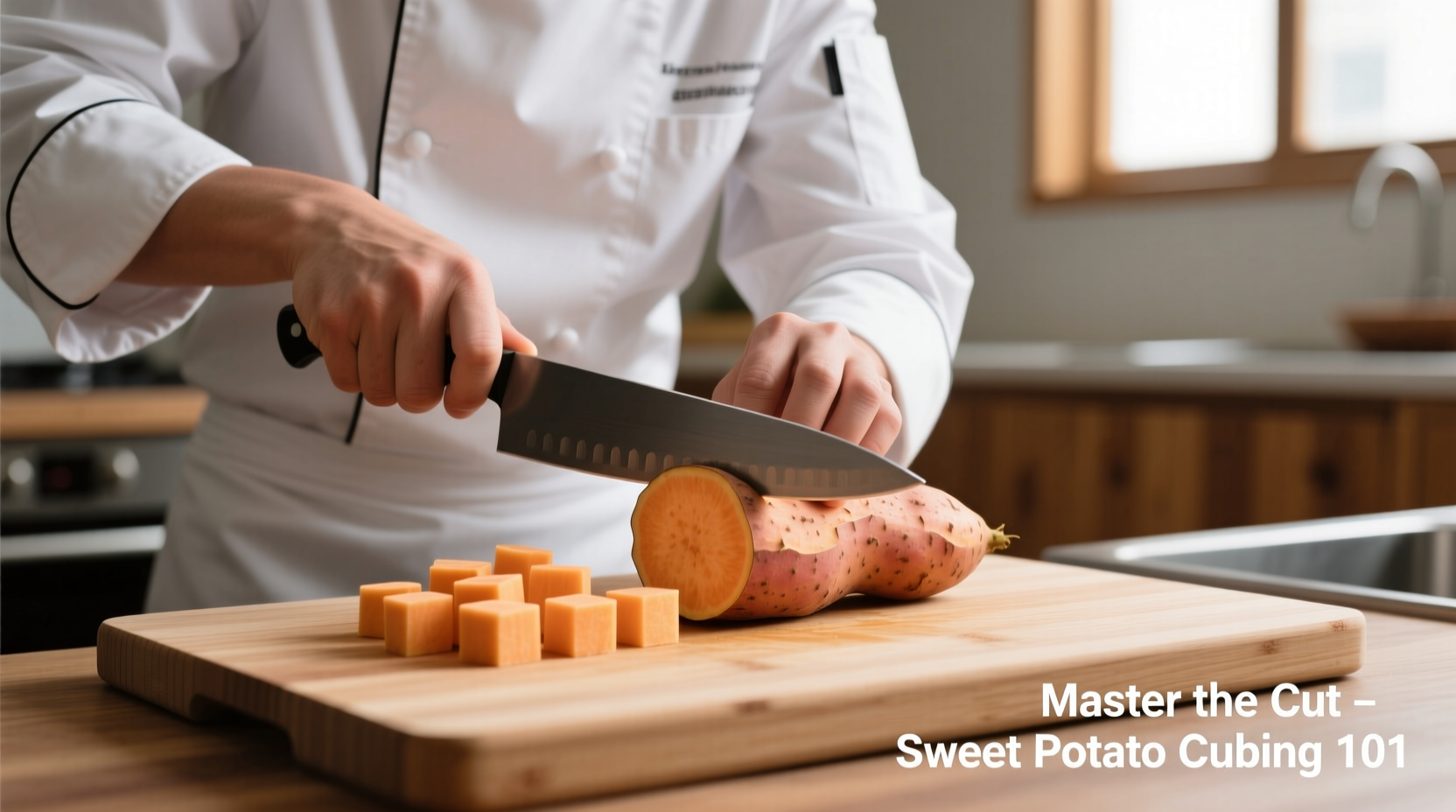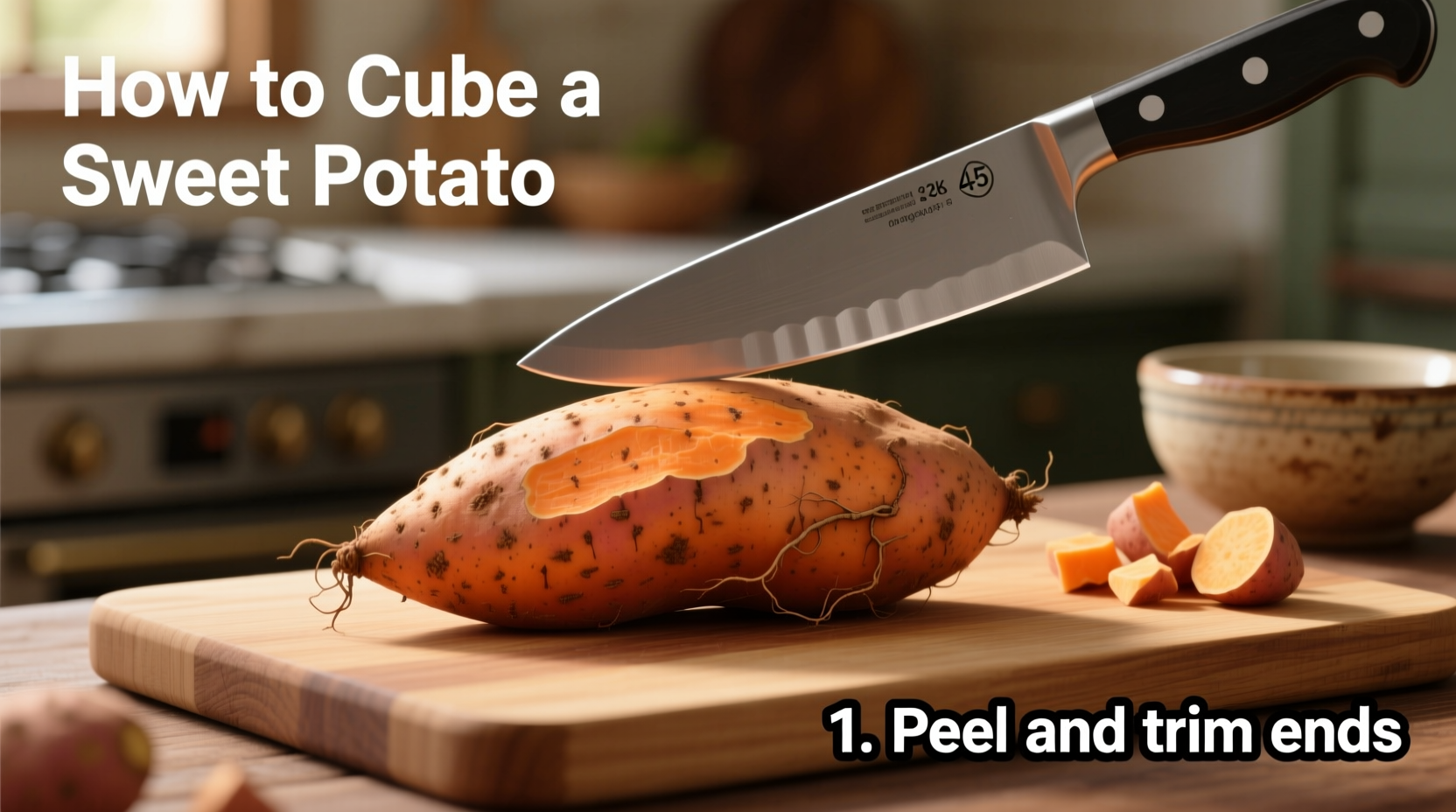Perfectly cubed sweet potatoes transform your cooking—whether you're roasting, stir-frying, or making salads. Getting consistent cubes isn't just about appearance; uniform pieces cook evenly, preventing some chunks from burning while others stay undercooked. As a professional chef with years of kitchen experience, I've found that mastering this basic knife skill elevates everyday cooking significantly.
Why Cube Sweet Potatoes Properly Matters
Unevenly cut sweet potatoes lead to inconsistent cooking results. When pieces vary in size, smaller cubes overcook while larger ones remain hard. Proper cubing ensures:
- Even cooking throughout
- Professional presentation
- Better texture in finished dishes
- Optimal surface area for caramelization when roasting
Essential Tools for Perfect Sweet Potato Cubes
You don't need specialized equipment, but having the right tools makes the process safer and more efficient:
| Tool | Why It Matters | Professional Tip |
|---|---|---|
| 8-10 inch chef's knife | Provides control and stability for firm vegetables | Keep your knife sharp—dull knives require more force and increase slip risk |
| Stable cutting board | Prevents dangerous movement during cutting | Place a damp towel underneath to secure the board |
| Vegetable peeler | Removes tough skin efficiently | Use a Y-shaped peeler for better grip on curved surfaces |
Step-by-Step: How to Cube a Sweet Potato Safely
Step 1: Prepare Your Workspace
Before handling your sweet potato, ensure your cutting board is stable and your knife is sharp. According to USDA food safety guidelines, always wash produce thoroughly before cutting, even if you plan to peel it, to prevent transferring surface contaminants to the flesh.
Step 2: Create Stable Flat Surfaces
Cut approximately 1/4 inch from both ends of the sweet potato. This creates flat surfaces you can use to stabilize the vegetable on your cutting board. Never try to cut a round vegetable without first creating a stable base—this is the most common cause of kitchen knife accidents.
Step 3: Slice into Planks
Stand the sweet potato upright on one flat end. Carefully slice horizontally into 1/2-inch thick planks. Consistent thickness is crucial for uniform cooking. Professional chefs recommend using the knuckle of your non-knife hand as a guide, keeping fingers curled safely away from the blade.
Step 4: Cut Planks into Sticks
Stack 2-3 planks at a time (depending on size) and slice vertically into 1/2-inch sticks. If the sweet potato is particularly large, you may need to cut planks in half first to create manageable stacks.
Step 5: Dice into Perfect Cubes
Gather your sticks and cut crosswise at 1/2-inch intervals to create uniform cubes. For roasting, 3/4-inch cubes work best; for salads or stir-fries, 1/4-inch cubes provide ideal texture. The American Culinary Federation emphasizes that consistent sizing directly impacts cooking results more than most home cooks realize.

Alternative Methods for Cubing Sweet Potatoes
While the knife method produces the best results, these alternatives work in specific situations:
- Food processor with julienne blade: Creates uniform sticks that you can then dice, but lacks precision for perfect cubes
- Sweet potato cuber tool: Specialized kitchen gadget that creates consistent cubes with minimal effort, though quality varies
- Mandoline slicer: Excellent for creating uniform planks, but requires extreme caution and a guard for safety
Common Mistakes to Avoid
Even experienced cooks make these errors when cubing sweet potatoes:
- Using a dull knife: Increases pressure needed and risk of slipping
- Skipping the flat surface step: Leads to unstable cutting and uneven pieces
- Creating inconsistent sizes: Results in uneven cooking
- Peeling after cutting: Makes handling difficult and wastes edible portions
- Rushing the process: Safety should always come first with sharp knives
What to Do with Perfectly Cubed Sweet Potatoes
Now that you've mastered cubing, put those perfect pieces to work:
- Roasting: Toss with olive oil, salt, and rosemary; roast at 400°F for 25-30 minutes
- Salads: Blanch cubes for 3-4 minutes, then add to grain salads
- Breakfast hash: Sauté with onions, bell peppers, and your favorite protein
- Curries: Add during the last 15 minutes of simmering for perfect texture
According to agricultural extension research from Cornell University, sweet potatoes retain more nutrients when cut into larger pieces and cooked quickly at high heat—making perfectly cubed sweet potatoes not just visually appealing but nutritionally beneficial.
Storage Tips for Cubed Sweet Potatoes
If you've cubed more than you need immediately:
- Store in cold water in the refrigerator for up to 24 hours to prevent browning
- For longer storage, blanch cubes for 2 minutes, then freeze in airtight containers for up to 3 months
- Never store cut sweet potatoes at room temperature—they oxidize quickly











 浙公网安备
33010002000092号
浙公网安备
33010002000092号 浙B2-20120091-4
浙B2-20120091-4